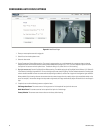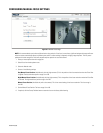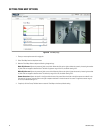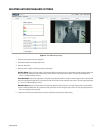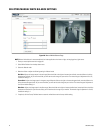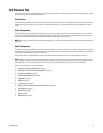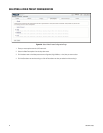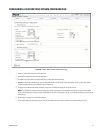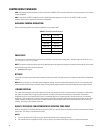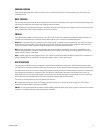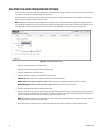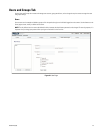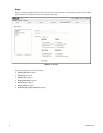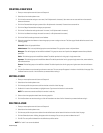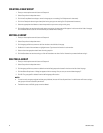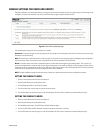
46 C2953M-B (10/09)
COMPRESSION STANDARDS
JPEG: A commonly used video compression scheme, also known as MJPEG. JPEG has the least impact on the camera's processor, but it requires
the most bandwidth.
H264: A new version of MPEG-4 compression used in high-definition video players such as Blu-ray
™
and HD-DVD. H.264 is the most
processor-intensive, but it requires the least amount of bandwidth.
AVAILABLE CAMERA RESOLUTION
Refer to the following table for the resolution capabilities of your camera model
Table B. Available Camera Resolution
IMAGE RATE
The image rate is the number of images per second (ips) available for the video stream configuration. Available image rates are 30, 25, 24, 15,
12.5, 12, 10, 8, 7.5, 6, 5, 4, 3, 2.5, 2, and 1.
NOTE: The maximum image rate setting might not be obtainable due to the programmed compression standard and the resolution of the stream.
Refer to the following section for more information:
• Specifications on page 62
BIT RATE
The bit rate is the quality of the video stream (rendered in kilobits per second). The higher the value, the higher the video quality and bandwidth
required.
NOTE: When you change any of the video stream configuration settings, the camera automatically adjusts the bit rate. If you manually reduce
the bit rate lower than the camera's automatic setting, the image quality might be reduced and the stream selection options might be limited.
I-FRAME INTERVAL
The I-frame interval configures the number of partial frames that occur between full frames in the video stream. For example, in a scene where a
door opens and a person walks through, only the movements of the door and the person are stored by the video encoder. The stationary
background that occurs in the previous partial frames is not encoded, because no changes occurred in that part of the scene. The stationary
background is only encoded in the full frames. Partial frames improve video compression rates by reducing the size of the video. As the I-frame
interval increases, the number of partial frames increases between full frames. Higher values are only recommended on networks with high
reliability. This setting is only available with H.264.
QUALITY OF SERVICE FOR DIFFERENTIATED SERVICES CODE POINT
Quality of Service (QoS) for Differentiated Services Code Point (DSCP) is a code that allows the network to prioritize the transmission of different
types of data. This setting is only available with H.264.
NOTES:
• If you are not familiar with DSCP, contact your network administrator before changing this setting.
• Your network must be configured to use QoS. If you are unsure if your network is QoS-aware, contact your network administrator.
1920 x 1080 640 x 480
1600 x 1200 640 x 352
1280 x 1024 480 x 368
1280 x 960 480 x 272
1280 x 720 320 x 256
800 x 600 320 x 240
640 x 512 320 x 176



